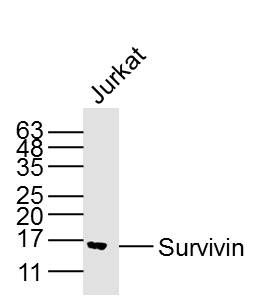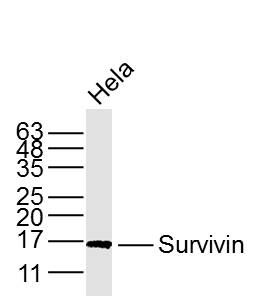
细胞凋亡抑制因子单克隆抗体
产品名称: 细胞凋亡抑制因子单克隆抗体
英文名称: Survivin
产品编号: hzm-33195M
产品价格: null
产品产地: 中国/上海
品牌商标: HZbscience
更新时间: 2023-08-17T10:24:20
使用范围: WB=1:500-1000 ELISA=1:500-1000 IHC-P=1:500-1000 IHC-F=1:500-1000 ICC=1:100-500 IF=1:500-1000
上海沪震实业有限公司
- 联系人 : 鲍丽雯
- 地址 : 上海市闵行区闵北路88弄1-30号第22幢AQ136室
- 邮编 : 200612
- 所在区域 : 上海
- 电话 : 139****0749 点击查看
- 传真 : 点击查看
- 邮箱 : www.shzbio.net
- 二维码 : 点击查看
Mouse Anti-Survivin antibody
| 产品编号 | hzm-33195M |
| 英文名称 | Survivin |
| 中文名称 | 细胞凋亡抑制因子单克隆抗体 |
| 别 名 | API4; API-4; API 4; Survivin variant 3 alpha; Apoptosis Inhibitor 4; Apoptosis inhibitor survivin; Apoptosis inhibitor4; Baculoviral IAP repeat containing 5; Baculoviral IAP repeat containing protein 5; Baculoviral IAP repeat-containing protein 5; BIRC 5; BIRC5; BIRC-5; EPR 1; EPR-1; IAP4; IAP-4; IAP 4; SVV; TIAP; BIRC5_HUMAN. |
| 研究领域 | 肿瘤 细胞生物 免疫学 细胞凋亡 |
| 抗体来源 | Mouse |
| 克隆类型 | Monoclonal |
| 克 隆 号 | Mix-mA™ |
| 交叉反应 | Human, Rat, |
| 产品应用 | WB=1:500-1000 ELISA=1:500-1000 IHC-P=1:500-1000 IHC-F=1:500-1000 ICC=1:100-500 IF=1:500-1000 (石蜡切片需做抗原修复) not yet tested in other applications. optimal dilutions/concentrations should be determined by the end user. |
| 分 子 量 | 16kDa |
| 细胞定位 | 细胞核 细胞浆 |
| 性 状 | Lyophilized or Liquid |
| 浓 度 | 1mg/ml |
| 免 疫 原 | KLH conjugated synthetic peptide derived from human Survivin: |
| 亚 型 | IgG |
| 纯化方法 | affinity purified by Protein G |
| 储 存 液 | 0.01M TBS(pH7.4) with 1% BSA, 0.03% Proclin300 and 50% Glycerol. |
| 保存条件 | Store at -20 °C for one year. Avoid repeated freeze/thaw cycles. The lyophilized antibody is stable at room temperature for at least one month and for greater than a year when kept at -20°C. When reconstituted in sterile pH 7.4 0.01M PBS or diluent of antibody the antibody is stable for at least two weeks at 2-4 °C. |
| PubMed | PubMed |
| 产品介绍 | background: May play a role in neoplasia. May counteract a default induction of apoptosis in G2/M phase. Interacts with tubulin. Inhibitor of caspase-3 and caspase-7. Component of the chromosomal passenger complex (CPC), a complex that acts as a key regulator of mitosis. The CPC complex has essential functions at the centromere in ensuring correct chromosome alignment and segregation and is required for chromatin-induced microtubule stabilization and spindle assembly. Belongs to the IAP family. Function: Multitasking protein that has dual roles in promoting cell proliferation and preventing apoptosis. Component of a chromosome passage protein complex (CPC) which is essential for chromosome alignment and segregation during mitosis and cytokinesis. Acts as an important regulator of the localization of this complex; directs CPC movement to different locations from the inner centromere during prometaphase to midbody during cytokinesis and participates in the organization of the center spindle by associating with polymerized microtubules. The complex with RAN plays a role in mitotic spindle formation by serving as a physical scaffold to help deliver the RAN effector molecule TPX2 to microtubules. May counteract a default induction of apoptosis in G2/M phase. The acetylated form represses STAT3 transactivation of target gene promoters. May play a role in neoplasia. Inhibitor of CASP3 and CASP7. Isoform 2 and isoform 3 do not appear to play vital roles in mitosis. Isoform 3 shows a marked reduction in its anti-apoptotic effects when compared with the displayed wild-type isoform. Subunit: Monomer or homodimer. Exists as a homodimer in the apo state and as a monomer in the CPC-bound state. The monomer protects cells against apoptosis more efficiently than the dimer. Only the dimeric form is capable of enhancing tubulin stability in cells. When phosphorylated, interacts with HBXIP; the resulting complex binds pro-CASP9, as well as active CASP9, but much less efficiently. Component of the chromosomal passenger complex (CPC) composed of at least BIRC5/survivin, CDCA8/borealin, INCENP, AURKB and AURKC. Interacts with JTB. Interacts with CDCA8 and INCENP; interaction is direct. Interacts with EVI5. Interacts with GTP-bound RAN in both the S and M phases of the cell cycle. Interacts with USP9X. Interacts with tubulin. Interacts with BIRC2/c-IAP1. The acetylated form at Lys-129 interacts with STAT3. The monomeric form deacetylated at Lys-129 interacts with XPO1/CRM1. The monomeric form interacts with XIAP/BIRC4. Both the dimeric and monomeric form can interact with DIABLO/SMAC. Interacts with BIRC6/bruce. Subcellular Location: Cytoplasm. Nucleus. Chromosome. Chromosome, centromere. Cytoplasm, cytoskeleton, spindle. Chromosome, centromere, kinetochore. Midbody. Note=Localizes on chromosome arms and inner centromeres from prophase through metaphase. Localizes to kinetochores in metaphase, distributes to the midzone microtubules in anaphase and at telophase, localizes exclusively to the midbody. Colocalizes with AURKB at mitotic chromosomes. Acetylation at Lys-129 directs its localization to the nucleus by enhancing homodimerization and thereby inhibiting XPO1/CRM1-mediated nuclear export. Tissue Specificity: Expressed only in fetal kidney and liver, and to lesser extent, lung and brain. Abundantly expressed in adenocarcinoma (lung, pancreas, colon, breast, and prostate) and in high-grade lymphomas. Also expressed in various renal cell carcinoma cell lines. Post-translational modifications: Ubiquitination is required for centrosomal targeting. In vitro phosphorylation at Thr-117 by AURKB prevents interaction with INCENP and localization to mitotic chromosomes. Phosphorylation at Thr-48 by CK2 is critical for its mitotic and anti-apoptotic activities. Acetylation at Lys-129 by CBP results in its homodimerization, while deacetylation promotes the formation of monomers which heterodimerize with XPO1/CRM1 which facilitates its nuclear export. The acetylated form represses STAT3 transactivation. The dynamic equilibrium between its acetylation and deacetylation at Lys-129 determines its interaction with XPO1/CRM1, its subsequent subcellular localization, and its ability to inhibit STAT3 transactivation. Similarity: Belongs to the IAP family. Contains 1 BIR repeat. SWISS: O15392 Gene ID: 332 Database links: Entrez Gene: 332 Human Entrez Gene: 11799 Mouse Entrez Gene: 64041 Rat Omim: 603352 Human SwissProt: O15392 Human SwissProt: O70201 Mouse SwissProt: Q9JHY7 Rat Unigene: 514527 Human Unigene: 8552 Mouse Unigene: 54471 Rat Important Note: This product as supplied is intended for research use only, not for use in human, therapeutic or diagnostic applications. Survivin是目前发现的最强的凋亡抑制因子,存活蛋白是细胞凋亡抑制基因家族中的一个新成员,主要表达于细胞周期中的G2/M期,在许多恶性肿瘤组织中均有表达,主要用于各种恶性肿瘤的研究。 是细胞凋亡的一种抑制因子、参与细胞凋亡调控,可以用于各种恶性肿瘤的细胞凋亡的研究。Survivin具有肿瘤特异性,只表达于肿瘤和胚胎组织,且与肿瘤细胞的分化增殖及浸润转移密切相关. |
| 产品图片 |
Sample: Jurkat Cell (Human) Lysate at 40 ug
Primary: Anti-Survivin (bsm-33195M) at 1/1000 dilution Secondary: IRDye800CW Goat Anti-Mouse IgG at 1/20000 dilution Predicted band size: 16 kD Observed band size: 16 kD |


